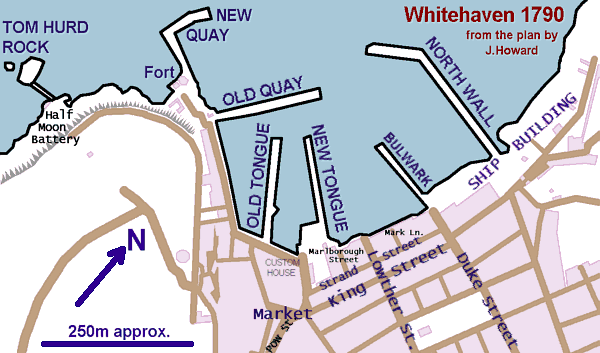

THE GREAT STORMS OF 1795-6
A CUMBRIAN VIEW, continued
| BACK TO DECEMBER 1795 |
Continuing the presentation of items from the "Cumberland Pacquet" newspaper, illustrating the effects of the tempestuous weather on communities and shipping in Cumbria, at the beginning of 1796. Most items are quoted verbatim, with spelling unmodernised [editorial comments bold, in square brackets]; note that it was customary, when referring to ships, to insert the master or captain's surname immediately after the ship's name.
This way to map and index of places outside Whitehaven
CP 5 Jan 1796: The Experiment, Collins, of Maryport, a new vessel upon her first voyage, is on shore near Braystones.
The Ruby, Crosthwaite, has returned to Workington, five weeks after having sailed on a voyage to Ireland, and without being able to accomplish it.- The oldest seamen scarcely remember so severe and boisterous a season as the present. [continues]
The Mary Ann, Lees, is on shore a little to the northward of Harrington harbour. [more]
Since our last, we have had frequent gales of wind and a great fall of rain. The storm on Wednesday night is thought to have been as severe as has been felt during the present winter; and it was succeeded by one of the most dark and dismal days that has been experienced since the beginning of November.
Since our last, nothing has sailed, owing to the very tempestuous weather.- One vessel of the former list (the Adventure, Bradshaw) has returned.
[Also reports of gales hampering the progress of Admiral Christian's fleet off the Scillies]
CP 12 Jan 1796: [No weather news]
CP 19 Jan 1796: The Ceres, Collins, from Lancaster, for the West Indies, is put into Pile of Foudrey, by contrary winds
Such a continuance of bad weather has not been remembered: for weeks past, there have not been twenty-four hours undisturbed by either wind or rain: and often severe storms from both. The difficulties, as well as dangers, experienced by the shipping, exceed those of former winters in a considerable degree: and their effects, even where the greatest misfortune is escaped, must be (and we are well assured they are) severely felt amongst numbers.
CP 26 Jan 1796: DREADFUL STORMS and HIGH TIDES
On Saturday last, we had one of the most dreadful storms of wind and rain that ever was known in this part. It continued the whole day and night, rose to a height never experienced since the year 1771; being not less than twenty-two feet at the end of the Old Quay; and the waves, from the great violence of the wind, were tossed with incredible fury all over the works of the harbour, and seemed to threaten them with entire demolition.- it appeared for some time impossible for any battlements to resist the force of the sea. The damage sustained was, however, comparatively small. A breach was made in the parapet of the New Quay, near the Fort. The military-guard, stationed at the fort, were driven off, the sea making a passage over the platform, several of the heavy cannon upon which were forced back upon their carriages. Several pieces of timber, many of them of a large size, were swept away from the building yards on the oposite side, though strongly secured; and some of them from places which had never been molested by the sea in the memory of the oldest persons living.
